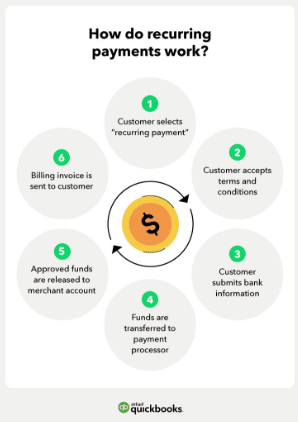- 5 minute read
Did you know that you can make regular payments without having to enter your details each time manually? This time-saver is possible with recurring payments or subscriptions. Recurring payments are electronic payments that automatically transfer funds from one bank account to another.
The basic definition of a recurring payment is a regular payment automatically deducted from a customer’s account. For example, you may have set up a recurring payment plan for your monthly retail subscription boxes; this means that a certain sum of money is automatically taken from your bank account to pay for the service every month. Automatic payments are also known as subscription billing or scheduled payments.
Often referred to as subscription billing or automatic payments, the recurring payment process guarantees payment from customers over time with minimal effort on behalf of businesses. With a systematic plan in place, companies can rest assured that their clients will pay promptly and have flexible options.
How Does a Recurring Payment Work?
By setting up a recurring payment plan, customers allow their business of choice to withdraw an agreed-upon sum from their account on prearranged terms. The company will then record and house the customer’s billing particulars while drafting payments at regular intervals, monthly or biweekly. Once the customer has set up their payment plan, they can be sure their services or products will be paid for in a timely manner. And, since the payment is automated, customers don’t have to worry about late fees.
The Benefits of Recurring Payments
For businesses, recurring payments provide a predictable source of income and enable them to plan their finances better. This payment type also helps companies to save time on invoicing and collecting payments, as they are no longer manually sending out invoices and collecting payment information. Moreover, recurring payments provide an excellent way to build customer relationships by offering them more flexible payment options.
Types of Recurring Payments
Regarding recurring payments, there are two main types of payment: fixed and variable. Fixed payments are a set amount taken from the customer’s account regularly. Variable payments can fluctuate depending on the amount of services or goods the business provides. For example, you may have a gym membership that requires you to pay a certain amount every time you use the facilities. Therefore recurring billing is an excellent way to offer flexible payment options for customers.
- Fixed recurring payments
Once the customer has approved a set payment amount, the merchant can process these payments without requesting new information. This allows businesses to easily manage and track their customer’s payments and process them regularly. Furthermore, merchants can set the payment frequency that best suits the needs of the business, such as monthly, quarterly, or annually. Next, the customer’s bank account will be debited on the predetermined date, and the merchant can rest assured that they will receive payment on time. Once the payment is made, a confirmation will be sent to the customer and the merchant.
- Variable recurring payments
Not only can businesses take a set amount from customer accounts, but they can also adjust the payment according to what is provided. The merchant can charge different amounts based on the customer’s spending behavior every billing cycle. This type of billing works well for subscription boxes or services offered on a usage basis, such as a software product. However, it is essential to note that variable recurring payments require the customer to input new payment information each time. But it’s not an issue when that information is stored securely.
How Recurring Payments Work
Recurring payments offer several benefits to businesses. For instance, eliminating the need to manage invoices, process payments, and manually send out customer reminders saves time and resources. In addition, using this type of payment method helps to prevent fraud because it securely stores and updates the customer’s payment information. Additionally, it provides a convenient payment option for both customers and merchants by simplifying the payment process and enabling businesses to offer flexible payment options. Lastly, businesses benefit from accurately predicting and tracking their cash flow since they know precisely when payments will be received.
- Reduce collection time and late payments
By teaming up with a reliable payment processor that focuses on recurring payments, you reduce the time you spend collecting payments and decrease the frequency of late payments. This is because the payment amount will be automatically deducted from the customer’s bank account on a fixed schedule, eliminating the need for the customer to remember to make payments. Customers can receive automatic payment reminders from merchants a few days before payment is due. The purpose of this service is to help ensure that customers make their payments on time while businesses can rely on receiving their expected payments.
- Improve customer relationship
Recurring payments are a convenient and reliable way to improve customer relationships. This feature allows customers to avoid the hassle of updating payment information or manually entering it for each purchase. Automation makes the payment process more manageable, benefiting both customers and merchants. Customers can enjoy a hassle-free payment experience, while merchants can improve customer loyalty and satisfaction by providing a secure and reliable payment option.
- Protect against fraud
Finally, recurrent payments offer a security layer for businesses by securely storing and frequently updating the customer’s payment information. Moreover, customers can add extra authentication methods, like two-factor authentication, during the payment process. Verifying the user’s identity and preventing unauthorized access to their account is important. The payment processor also adds extra security measures, like monitoring suspicious activity and using encryption technology, to protect customers’ data.
Conclusion
Recurring payments are the ultimate convenience for both businesses and customers. Not only do they offer a hassle-free, automated payment collection system, but they also provide an advantageous source of consistent income to business owners. Plus, it’s a great way to strengthen customer relationships by providing them with more manageable payment options. In short, recurring payments simplify life for all involved parties – what could be better? Whether for customers or businesses, it can benefit both! And it’s a great way to ensure customers keep returning and staying loyal.

Want to learn more about your recurring payment processing options?
Contact us today, we’d love to chat with you about how recurring payments can work for your business. It’s another way we are here for our merchants All the Way to Paid ™. Reach out to us with your questions at [email protected]



